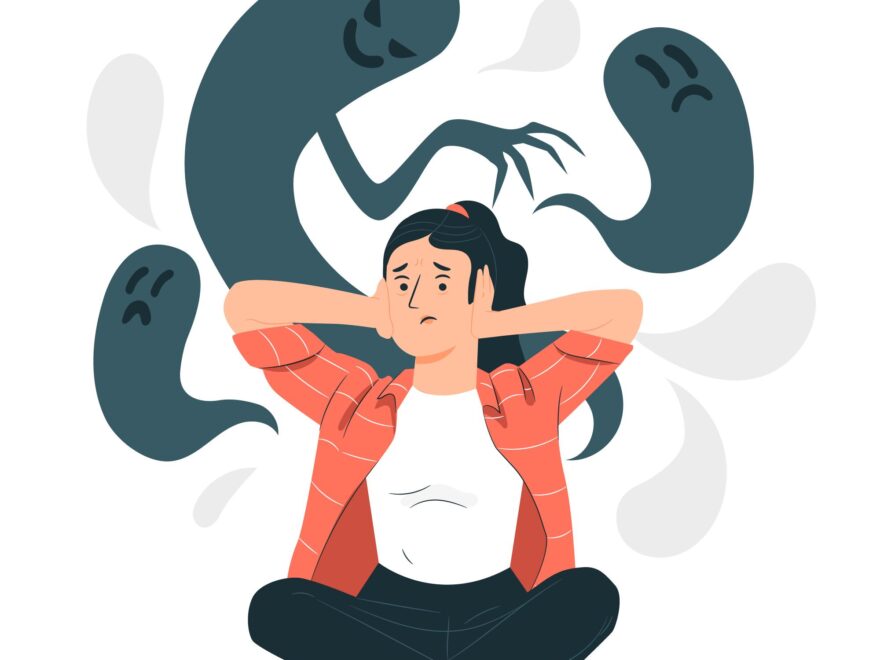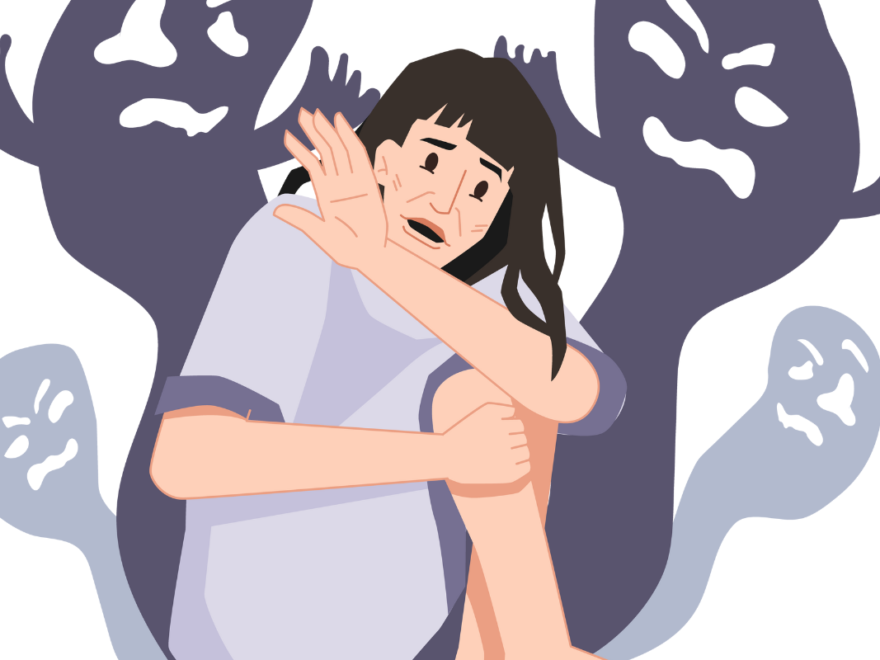Schizophrenia
Schizophrenia is a serious mental health condition affecting thoughts, feelings, and behavior. It can cause hallucinations (seeing or hearing things others don’t), delusions (false beliefs), and disorganized thinking. This can make daily life very difficult.
Lifelong treatment includes medication, therapy, and support for daily activities. Many with schizophrenia don’t realize they have it or refuse treatment. Research shows untreated psychosis leads to worse symptoms, more hospital stays, cognitive decline, injuries, and even death. Early treatment helps manage symptoms and improves long-term outcomes.

Symptoms of Schizophrenia
Schizophrenia involves a range of problems in how people think, feel, and behave. Symptoms may include:
- Delusions. This is when people believe in things that aren’t real or true. For example, people with schizophrenia could think that they’re being harmed or bullied when they aren’t. They could feel that they’re the target for certain gestures or comments when they aren’t. They may think they’re famous or have great ability when that’s not true. Or they could feel that a major disaster is about to occur when that’s not true. Most people with schizophrenia have false beliefs.
- Hallucinations. These usually involve seeing or hearing things that other people don’t observe. For people with schizophrenia, these things seem real. Hallucinations can occur with any of the senses, but hearing voices is most common.
- Mixed-up thoughts and words. Disorganized speech causes disorganized thinking. It can be challenging for people with schizophrenia to talk with other people. The answers people with schizophrenia give to questions may not be related to what’s being asked. Or questions may not be answered fully. Rarely, speech may include putting together unrelated words in a way that can’t be understood. Sometimes, this is called word salad or jumbled words.
- Extremely disorganized or unusual motor behavior. This may show in several ways, from childlike silliness to being upset for no reason. Behavior isn’t focused on a goal, so doing tasks is hard. People with schizophrenia may not want to follow instructions. They may move in ways that are not typical or unfit to the social setting. Or they may not move much or respond at all.
- Negative symptoms. People with schizophrenia may not be able to operate in the way they could before their illness started. They may speak in a flat tone and not be able to feel pleasure. Also, they may lose interest in everyday activities, socially pull back, and have difficulty planning.
Symptoms can vary in type and how severe they are. At times, symptoms may get better or worse. Some symptoms may be present at all times.
People with schizophrenia usually are diagnosed in the late teen years to early 30s. In men, schizophrenia symptoms typically start in the late teens to early 20s. In women, symptoms usually begin in the late 20s to early 30s. There also is a group of people — usually women — who are diagnosed later in life. It isn’t typical for children to be diagnosed with schizophrenia.
Symptoms in Teenagers
Schizophrenia symptoms in teenagers are like those in adults, but the condition may be harder to pinpoint. That’s because some early symptoms of schizophrenia — those that occur before hallucinations and false beliefs— are commonly seen in many teens, such as:
- Pulling away from friends and family.
- Not doing well in school.
- Having trouble sleeping.
- Feeling depressed.
- Lacking motivation.
Also, the use of recreational drugs, such as marijuana, stimulants like cocaine and methamphetamines, or hallucinogens, can cause similar symptoms. Compared with adults with schizophrenia, teens with the condition may be less likely to have delusions and more likely to have hallucinations.
When to See A Doctor?
People with schizophrenia often don’t know that they have a mental condition that needs medical attention. As a result, family or friends usually need to get help.
Helping Someone Who May Have Schizophrenia
If people you know have symptoms of schizophrenia, talk to them about your concerns. While you can’t force them to seek help, you can offer encouragement and support. You also can help them find a healthcare professional or mental health professional.
Some people may need an emergency stay in a hospital.
Suicidal Thoughts And Behavior
Suicidal thoughts and attempts are much higher than average in people with schizophrenia. If a person is in danger of suicide or has made a suicide attempt, make sure that someone stays with that person.
Proper treatment of schizophrenia can reduce the risk of suicide.
Causes of Schizophrenia
It isn’t known what causes schizophrenia. However, researchers believe that a mix of genetics, brain chemistry, and environment can play a part.
Risk factors of Schizophrenia
Although the cause of schizophrenia is not known, these factors seem to make schizophrenia more likely:
- A family history of schizophrenia.
- Life experiences, such as living in poverty, stress, or danger.
- Some pregnancy and birth issues, such as not getting enough nutrition before or after birth, low birth weight, or Introduction to toxins or viruses before birth, may affect brain development.
Complications
Left untreated, schizophrenia can lead to severe problems that affect every area of life.
- Suicide, suicide attempts, and thoughts of suicide.
- Anxiety disorders and obsessive-compulsive disorder, also known as OCD.
- Depression.
- Misuse of alcohol or other drugs, including nicotine.
- Not being able to work or attend school.
- Money problems and homelessness.
- Social isolation.
- Health and medical problems.
- Being victimized.
- Violent behavior, though people with schizophrenia are more likely to be attacked rather than attack others.
Prevention
There’s no sure way to prevent schizophrenia. However, staying with your treatment plan can help stop symptoms from worsening. Researchers hope that learning more about risk factors for schizophrenia may lead to earlier diagnosis and treatment.
Diagnosis of Schizophrenia
Diagnosis of schizophrenia involves ruling out other mental health conditions and making sure that symptoms aren’t due to substance misuse, medicine, or a medical condition.
Finding a diagnosis of schizophrenia may include:
- Physical exam. This may be done to remove other problems that could cause similar symptoms and check for related complications.
- Tests and screenings. These may include tests that help rule out conditions with similar symptoms and screening for alcohol and drug use. A healthcare professional also may request imaging studies, such as an MRI or a CT scan.
- Mental health evaluation. A healthcare professional or mental health professional checks mental status by noting how a person looks and behaves and asking about thoughts, moods, false beliefs, hallucinations, substance use, and potential for violence or suicide. This evaluation includes family and personal history.
Treatment of Schizophrenia
Continuous care with medicines and psychosocial therapy can help manage schizophrenia, though there is no cure for it. These treatments are needed even when symptoms ease. Some people may need to stay in a hospital during a crisis if symptoms are severe.
A psychiatrist experienced in treating schizophrenia usually guides treatment. The treatment team may also include a psychologist.
Medicines
Medicines are a MUST for schizophrenia treatment. Antipsychotic medicines are the most commonly used drugs. They’re thought to control symptoms mainly by affecting brain receptors for different neurotransmitters or chemical messengers. Most antipsychotic medications act on dopamine and serotonin receptors.
The goal of treatment with antipsychotic medicines is to manage symptoms at the lowest possible dose. A psychiatrist may try different medicines, combinations, and doses over time to get the desired result. Other medicines also may help, such as antidepressants, mood stabilizers, or antianxiety drugs. It can take several weeks to see whether the medicine helps symptoms get better.
Because medicines for schizophrenia can cause side effects, people with schizophrenia may not want to take them. A psychiatrist monitors for side effects and, in some cases, may order blood work. Medication choices can be guided to avoid specific unwanted side effects.
Antipsychotic medicines can be classified as either first-generation or second-generation. Second-generation antipsychotic medication may have fewer side effects related to muscle movements. This includes tardive dyskinesia, which causes repetitive and uncontrolled movements, such as frowning, eye blinking, and other movements. Tardive dyskinesia is sometimes permanent.
Second-generation antipsychotics
The newer, second-generation medicines available as a pill or capsule include:
- Aripiprazole
- Asenapine
- Brexpiprazole
- Cariprazine
- Clozapine
- Iloperidone
- Lumateperone
- Lurasidone
- Olanzapine
- Paliperidone
- Quetiapine
- Risperidone
- Xanomeline and trospium chloride
- Ziprasidone
First-generation antipsychotics
First-generation antipsychotics include:
- Chlorpromazine
- Fluphenazine
- Haloperidol
- Perphenazine
Long-acting injectable antipsychotics
Some antipsychotics may be given as a long-acting shot in the muscle or under the skin. They usually are given every 2 to 4 weeks but sometimes less often or more often. They may be an option for people who prefer fewer pills. Also, shots may help people stay with their treatment plans.
Common medicines that are available as shots include:
-
- Aripiprazole
- Fluphenazine decanoate
- Haloperidol decanoate
- Paliperidone
- Risperidone
Psychosocial interventions
Once symptoms get better, continuing to take medicine is important. It’s also important to take part in psychological and social or psychosocial treatments, including:
-
- Individual therapy. Talk therapy, also known as psychotherapy, may help improve thought patterns. Also, learning to manage stress and find early warning signs of the return of symptoms can help people manage their illness.
- Social skills training. This focuses on making communication and social interactions better and making people with schizophrenia better able to take part in daily activities.
- Family therapy. During this therapy, families learn how to deal with schizophrenia. They also get support.
- Vocational rehabilitation and supported employment. This counseling focuses on helping people with schizophrenia prepare for, find, and keep jobs.
Most people with schizophrenia need support in daily life. With the right treatment, most people with schizophrenia can manage their illness.
Hospital Stay
During crisis periods or times of severe symptoms, people may need to stay in a hospital for their safety. A hospital stay also ensures they eat right, get enough sleep, and bathe regularly.
Electroconvulsive Therapy
Healthcare professionals may consider electroconvulsive therapy (ECT) for adults with schizophrenia who don’t respond to drug therapy. Electroconvulsive therapy (ECT) is a method done with medicine that puts you to sleep, called general anesthetic. While you are asleep, small electric currents are passed through the brain, causing a therapeutic seizure that lasts 1 to 2 minutes. ECT also can help people with depression.
Coping and Support
Coping with a mental condition as serious as schizophrenia can be hard for people with the condition and their friends and family. Here are some steps that may help:
- Build strong relationships with members of your treatment team. Working closely with your doctor, mental health professional, and other care team members makes you better able to fully take part in and benefit from treatment.
- Learn about schizophrenia. Education about this condition can help you understand the importance of following your treatment plan. Education can also help friends and family learn more about the condition and be more compassionate toward those with it.
- Get more sleep. If you’re having problems in sleeping, lifestyle changes can help.
- Stay focused on goals. Managing schizophrenia is an ongoing process. Keeping treatment goals in mind can help you stay motivated, manage the condition, and work toward your goals.
- Don’t use alcohol or drugs. Using alcohol or recreational drugs can make it hard to treat schizophrenia. But quitting can be difficult. Get advice from your healthcare team on how best to stop.
- Ask about social services. These services may be able to help with affordable housing, transportation and other daily activities.
- Learn relaxation and stress management. Stress management techniques such as meditation or yoga may help you and your loved ones.
- Join a support group. Support groups can help you reach out to others facing the same challenges. Support groups also may help family and friends cope.
Sehatyab is an online platform that helps patients with Schizophrenia deal with their psychological problems. This platform brings together the best psychologists and psychiatrists from Pakistan and makes it easier for the general public with mental health issues to have easy access to them. They offer the needed therapy and techniques that help manage the symptoms of schizophrenia easily.
Preparing for your appointment
If you’re seeking help for a loved one with schizophrenia, you may start by consulting a psychiatrist at SehatYab.
What you can do
To prepare for the appointment, make a list of:
- Symptoms your loved one has, including those that don’t seem related to the appointment.
- Key personal information, including any major stresses or recent life changes.
- Medicines, vitamins, herbs, and other supplements your loved one takes, including the doses.
- Questions to ask the psychiatrist.
Go with your loved one to the appointment. Doing so will help you know what your loved one is facing and how you can help.
For schizophrenia, you can ask some basic questions, such as:
- What could cause the symptoms or condition?
- What are other possible causes for the symptoms or condition?
- What kinds of tests are needed?
- Will my loved one be affected by this condition for a long time?
- What’s the best treatment?
- What are the options for the primary approach you’re suggesting?
- How can I help and support my loved one?
Don’t hesitate to ask any other questions during your appointment.
What to expect from your doctor
The healthcare professional likely will ask you several questions. Preparing for some of these questions can help make the discussion more useful. Questions may include:
- What symptoms does your loved one have, and when did you first notice them?
- Has anyone else in your loved one’s family been diagnosed with schizophrenia?
- Do symptoms occur some of the time or all of the time?
- Has your loved one talked about suicide?
- How well does your loved one do in daily life? Is your loved one eating regularly, going to work or school, and bathing regularly?
- Has your loved one been diagnosed with other medical conditions?
- What medicines does your loved one take?
The healthcare or mental health professional will ask more questions based on responses, symptoms, and needs.
Our Doctors for Schizophrenia Treatment
Dr. Muhammad Ather
Psychiatrist
MBBS (RMU), DPM (Cardiff University, UK), MRCPsych (Royal College of Psychiatrist, London UK), CCT (Royal College of Psychiatrist, UK), Assistant Prof of Clinical Psychiatry
Experience: 27+ years
Dr. Syed Masroor Ali
Psychiatrist
MBBS, MCPS, Certified RANZCP Forensic Psychiatry (The Royal Australian and New Zealand College of Psychiatrists)
Experience: 35+ years
Our blogs on Schizophrenia

Common Questions about Schizophrenia in Pakistan?

شیزوفرینیا کا تعارف، اسباب اور علاج
شیزوفرینیا ایک انتہائی سنگین نوعیت کی ذہنی بیماری ہے جس کے اثرات کی وجہ سے نہ صرف مریض کی ذاتی ، معاشرتی زندگی متاثر ہوتی ہے بلکہ یہ بیماری مریض سے جڑے لوگوں کی زندگيوں پر بھی شدیداثرات مرتب کرتی ہے ۔




